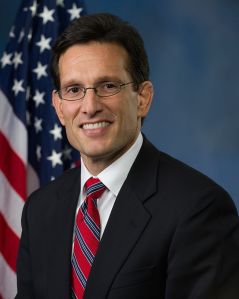Eric Cantor, the Face of GOP Obstructionism
**UPDATE** The news outlets are reporting that Eric Cantor lost his primary today. Unfortunately, Dave Brat may be worse than Cantor was, because he’s a Tea Party candidate, but he won’t have the clout that Cantor had.
Most of us are familiar with Eric Cantor, because he’s one of the more prominent members of the House GOP, and one of the biggest faces of GOP obstructionism in Congress. He’s the majority leader, and serves Virginia’s 7th congressional district. He also faces a Tea Party primary next week on the 10th, which promises to be interesting, mostly because Cantor’s district is unhappy with his performance. The 7th district is a conservative stronghold in the swing state.
To many people in that district, and across the country, Cantor is a symbol of all that’s wrong with Washington. He’s definitely a symbol of obstructionism; he was one of the architects of the 2011 debt ceiling showdown, which led to the first-ever reduction in the U.S.’s credit rating.
When it came to the 2013 government shutdown, Cantor played cheerleader to Senate Republicans, telling them to stand strong, and not back down. His fellow Virginia colleagues got on his case about that, saying that he prevented lawmakers from voting on any bills that might end the shutdown. Jim Moran and Gerry Connolly, both Democrats, blasted Cantor because they believed the shutdown hurt Virginia more than just about anybody else. One-third of the state’s population is made up of federal employees, many of whom were furloughed, and all of whom went unpaid for that time.
Cantor said that the GOP was not “the party of ‘no,'” but rather, the party of principled opposition. That was in response to their opposition to Obama’s stimulus package, but “principled opposition” they most certainly are not. Standing on principles is one thing. Digging in your heels to make a point, even if means that you hurt millions of people, isn’t “principled opposition.” What they do, and what Cantor supports and engages in is out-and-out obstructionism.
But he apparently doesn’t obstruct enough. His primary opponent, David Brat, is upset that Cantor voted yes on H.R. 2775, which is the bill that ended last October’s shutdown. The Tea Party as a whole is angry at him for that, because they wanted him to dig his heels in and keep the government closed down until they got what they wanted (which was a full defunding of the Affordable Care Act). So, at least when it comes to obstruction, Brat is not a better candidate than Cantor, although he wouldn’t have Cantor’s seniority and influence if he got elected.
What the Tea Party needs to learn is that we need a Congress full of Republicans and Democrats that are willing to work with the each other, instead of these childish, “We’re not budging until we get what we want. And if the effects if our obstruction hurt the people now, too bad. They’ll thank us later.” Compromise must be the name of the game, and we need people in office who not only understand that, but can also get their constituents to understand that as well. Neither Cantor nor his opponent are capable of that.
Since Cantor’s district is such a conservative stronghold, it’s unlikely that any Democrat will hold office there anytime soon. But, people of the 7th District, it’s time to find someone who is willing to work with the opposition, and not someone who will continue to obstruct. Cantor has a history of obstruction, and his opponent has lambasted him for “giving in” on that obstruction.
Filed under: Election 2014, GOP Obstruction, Politics | 2 Comments

You write that David Brat may be worse than Cantor. Sure, but the odds are long that David Brat gets through the general election. The dude spent something like $50k on his whole campaign. He won’t have the network, connections, or capital to compete in a general election, and I’m sure the GOP is hesitant to throw him a bone after he slayed their leader.
Hope you’re right.